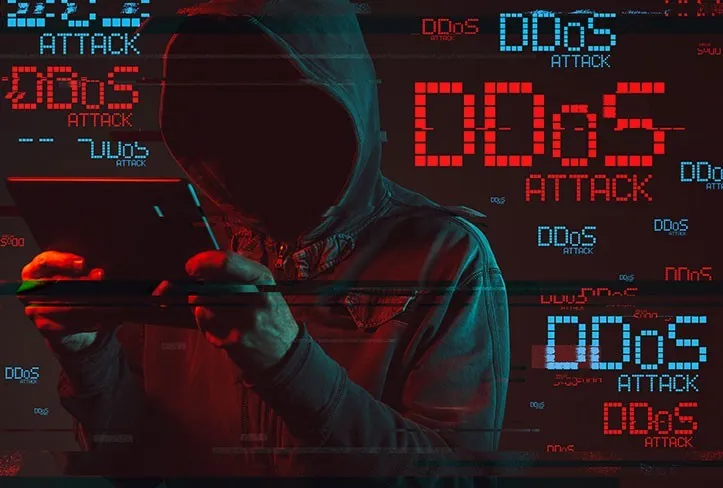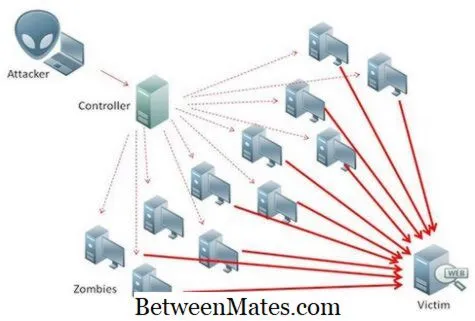
WHAT IS A DDOS ATTACK?
DDoS means 'Circulated Denial of Service' and alludes to when a programmer utilizes different gadgets or IP delivers to assault a framework to where it is delivered unusable for the client, or crashes totally. There are various manners by which a programmer can do this, and that is one of the explanation DDoS assaults are probably the most perilous on the web. Better approaches for completing a DDoS assault are continually being endeavored and organizations are regularly the ones who need to follow through on the weighty cost.
The most widely recognized kinds of DDoS assaults are SYN Flood Attacks which represent 94% of DDoS assaults. A SYN Flood is the point at which the programmer utilizes different IP delivers to abuse the TCP association or "handshake" arrangement. The programmer will normally set up a bot to send different "handshake" demands in such quick progression that the worker getting the solicitations will be not able to finish them and will at last crash.


WHY DO DDOS ATTACKS HAPPEN?
For some odd reason, DDoS assaults much of the time aren't fiscally roused—which separates them from a large portion of different kinds of digital assaults out there on the web. Indeed, there have been various reports of DDoS assaults which happened in light of the fact that a programmer needed to savage, or fundamentally have a good time, demolishing another person's day.
So for what reason do it in any case?
Indeed, there are various non-money related things which can be acquired from a DDoS assault, and one of the large ones is clients. At the point when a contending organization DDoS's their opposition in a manner which stops the usefulness of the site, clients might be headed to head off to some place else, particularly in the event that they need to item desperately. This leads numerous organizations to speculate that DDoS assaults are done by their opposition. What's more, they frequently are right. Another significant justification various enormous DDoS assaults in the past have been because of political, strict, or activism reasons. There are many major DDoS reports from government sites essentially on the grounds that individuals are against the public authority or the taxpayer driven organization offered on the site. Concerning strict reasons, quite possibly the most renowned DDoS assaults in 2012 was done by the Muslims who were DDoSing various US bank applications and sites to get pictures of Muhammad eliminated from the media. Also, there are frequently reports of organizations who may participate in rehearses like creature testing being the survivors of DDoS assaults on account of the manner by which they work together.
Furthermore, these aren't the solitary explanations behind DDoS assaults. They can likewise be done as vengeance plots by displeased ex-workers. Also, regardless of whether the assaults may appear to be non-noxious, they could be a pre-cursor of a more genuine assault to come. This is on the grounds that a programmer might be utilizing a DDoS assault to discover weaknesses in the framework with the plan of returning to misuse said weaknesses later. That, yet there are various DDoS for employ administrations on the dim web, so regardless of whether your foe or rivalry doesn't have the foggiest idea how to play out a DDoS, they can undoubtedly subcontract the work to another person. What's more, this is the thing that makes DDoS assaults so genuine.
HOW TO PREVENT A DDOS ATTACK
Since the obstruction for passage for a programmer to play out a DDoS assault is low, it is quite possibly the most incessant digital assaults on organizations' sites. In any case, shockingly, there isn't a lot of innovation to forestall one. This is on the grounds that most DDoS assaults can bypass essential firewalls and other security frameworks, so the settling of them normally requires manual information—which implies one of the solitary approaches to ensure yourself against these assaults is by recruiting somebody to screen your site for security.
Presently obviously, in case you're an independent venture, having nonstop specialized security simply isn't plausible. Accordingly, there are various organizations which can be contracted out to do security for your site, or various sites regularly to choose to have an IT individual on retainer whom they can call habitually for help. For some more modest organizations, this still isn't in the financial plan, and there are really various organizations which can be paid to attempt to break your site security utilizing various hacks like DDoS. On the off chance that they are effective, this is a sign your site isn't yet prepared for dispatch and needs really testing first. As a result of the manner in which innovation can change rapidly, it is exhorted that on the off chance that you do go this last course, that you pay to have your site retested consistently. It is recommended that you pay to have your website retested regularly.

FAMOUS DDOS ATTACKS
DDoS assaults are unimaginably normal, yet obviously, various organizations don't report them inspired by a paranoid fear of losing client certainty. In December 2020, Bitcoin.org was a casualty of a DDoS assault which brought about the site losing all usefulness for a couple of hours. It's imperative to take note of that the hack didn't influence Bitcoin, basically the site in which clients can download a wallet and purchase the coin. While the site was down, assailants duplicated a portion of the open source programming (known as Bitcoin Core) from the site and conveyed it to clients who wished to download it by means of downpour. The assault was followed to Russian IP addresses, yet since DDoS aggressors much of the time utilize taken IP addresses, it's impossible to say where they assault really started from.
Considerably really stunning, in the months since August 2020, various installment processors like PayPal and MoneyGram, have been the objective of many DDoS assaults. These assaults were extremely enormous in nature, and were trailed by recover messages requesting that the organizations pay Bitcoin to the programmers for the assaults to stop. It's muddled if any of the sites have settled up, yet it's improbable, in light of the fact that sites, for example, PayPal have such exceptional security that while DDoS assaults are irritating to them, it's not prone to trouble their usefulness or client use to where they would have to pay to have them halted. Likewise, as history has shown them, paying a DDoS con artist customarily doesn't make them disappear, it simply instructs the con artist they can get cash from the organization on the off chance that they continue to assault.
Generally speaking, the universe of network protection is an unnerving spot, particularly with regards to forestalling breaks, for example, a DDoS assault. This is the reason, as a client or entrepreneur, it's critical to see how network safety functions, and find ways to restrict your conceivable openness to web wrongdoing by improving your site security. DDoS assaults unquestionably aren't new, and they certainly will not be disappearing any time soon.